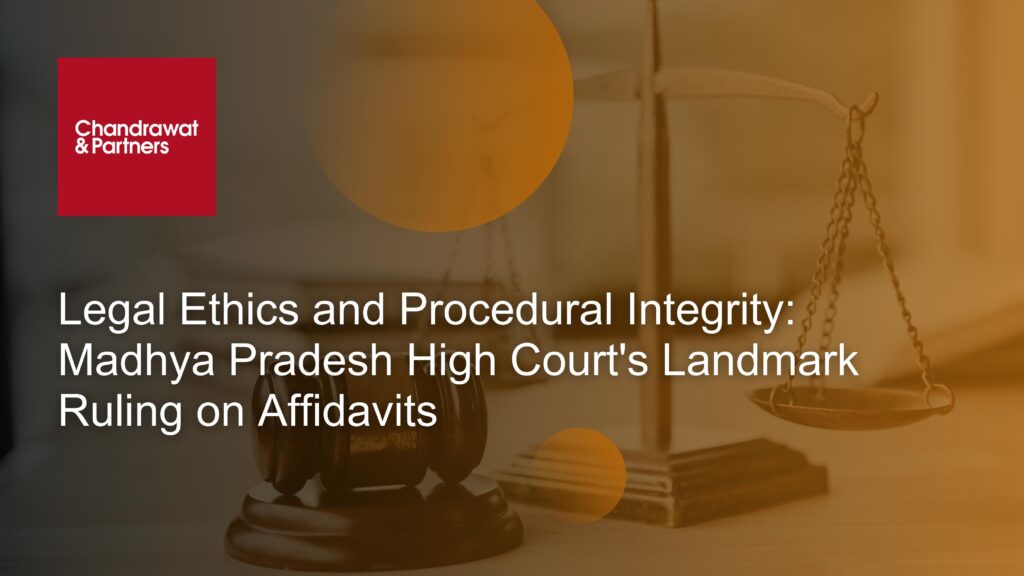Home > Recent Judgements > Legal Ethics and Procedural Integrity: Madhya Pradesh High Court’s Landmark Ruling on Affidavits
May 16, 2025
Legal Ethics and Procedural Integrity: Madhya Pradesh High Court’s Landmark Ruling on Affidavits
In a significant development, the Madhya Pradesh High Court has issued a directive that reshapes role of advocates in affirming their clients’ factual assertions. On May 14, 2025, a bench comprising Justice Vivek Rusia and Justice Gajendra Singh ruled that lawyers are prohibited from filing affidavits to verify the facts stated in applications on behalf of their clients.
The court emphasized that such practices compromise the integrity of judicial proceedings and ordered the registry not to accept applications supported solely by affidavits from advocates.
The Case: Lavkesh v. State of Madhya Pradesh
The case in question involved an application seeking the suspension of a convict’s sentence. The application was supported by an affidavit sworn by the convict’s counsel, asserting that the client was falsely implicated and had committed no offense.
The court questioned the validity of such an affidavit, noting that the advocate was not present at the time of the alleged incident and thus could not verify the facts firsthand.
This led to the dismissal of the application and the subsequent directive to the Bar Association to issue guidelines advising lawyers against filing affidavits verifying facts on behalf of their clients.
Legal and Procedural Implications
- Affidavit Rules Under the High Court of Madhya Pradesh Rules, 2008
The High Court of Madhya Pradesh Rules, 2008, stipulate that affidavits should be sworn by individuals who have direct knowledge of the facts stated therein. Specifically, Rule 5(1) mandates that every affidavit must be sworn only by a person who is acquainted with the facts of the case. The advocate, representing a party, is typically not a witness to the events in question and therefore cannot verify the facts through personal knowledge.
- Impact on Legal Practice
This ruling necessitates a shift in legal practice, requiring parties to provide affidavits from individuals with direct knowledge of the facts. Advocates will now need to ensure that their clients or other knowledgeable individuals swear affidavits, rather than relying on the advocate’s own affidavit. This change aims to enhance the authenticity of the information presented to the court and uphold the principles of justice.
- Strengthening Judicial Integrity
By discouraging the filing of affidavits by advocates to verify facts, the court seeks to prevent the misuse of affidavits to present unverified or false information. This measure is designed to maintain the sanctity of judicial proceedings and ensure that decisions are based on truthful and verified facts.
Broader Implications
This decision by the Madhya Pradesh High Court sets a precedent for other judicial bodies in India, encouraging a more stringent approach to the verification of facts in legal proceedings. It underscores the judiciary’s commitment to upholding the rule of law and ensuring that legal processes are not undermined by unverified assertions. Legal practitioners across the country may need to reassess their practices regarding the submission of affidavits and ensure compliance with this directive to maintain the credibility of their cases.
Conclusion
The Madhya Pradesh High Court’s ruling marks a pivotal moment in the evolution of legal procedures, emphasizing the necessity for factual accuracy and personal knowledge in the verification of information presented to the court. By curbing the practice of advocates filing affidavits to affirm their clients’ factual claims, the court aims to fortify the integrity of the judicial system and promote a more transparent and accountable legal process.
For more information or queries, please email us at
enquiries@chandrawatpartners.com





